|
Short Fiction ~ Dragan Todorovic —For Raymond Queneau The morning flight to Paris is always full. It carries us—the working class of the new world, people like me, who fly in, do the job, get lost. I recognised about half of the passengers. With few I exchanged hellos. When we landed at CDG it was as if the plane had been cut in two. Business people: purposefulness in their stride. Those arriving for pleasure: slow in everything, slow to get up, slow to take their bags from the overhead. They dragged their feet through the exit tunnel, into the building, then they started reading signs… I understand that: unsure what would be important in the end, tourists cram memories into their every move. But I had things to do and knew the airport. Straight on the series of travelators, turn right at the end, the middle door opens fastest, left by the giant flight table—careful there through the flocks of confused travellers—right into the leather recliner area, down the escalator, left through the revolving doors—no need to make the arch inside them, just go straight!—get into the corralled zone leading to the border checks. Everyone slows in this, last stage. For security reasons, these areas are under stronger lights, and passengers start to wipe their eyes as if waking up, as if their whole flight has been just a dream, and their reality is this huge, depressing space sliced into thin passages by the blue crowd-control tapes. Then they hesitate, as people do with uniforms around them. Have you noticed that? I bet the uniforms don’t have to be filled with people. Just hang the uniforms around and they slow down, they want to enter the right lane, they don’t want to anger the Gatekeepers. I guess this part is somehow too close to the final border checks, the ones where you hold your soul in your teeth before Saint Peter. And it’s here that we who know always overtake everyone else, without pushing, without elbowing anyone. We’ve been checked and rechecked before. We’ll pass. The area leading to the glass booths was unusually empty, so I hurried through the labyrinth. The couple ahead—until then holding well—stopped suddenly halfway down and I passed by. In the left lane, reserved for crews and VIPs, three men and a woman were dealing with someone in a wheelchair. They stood in front of a side door. One of the men was a civilian, and he bent over the wheelchair to help with something. The woman was smiling at something he had said. Black uniforms. They looked like they knew each other. Banter. Ahead, pretty black hostesses dressed in peach jackets and tight black trousers were waiting for the flood of arrivals that would start later. Whoever had chosen them will be in trouble soon. They are too beautiful and a feminist will catch that. Mark my words. Someone will be cancelled here. As I approached, I saw a young policewoman entering a booth, just starting her shift, and I hurried into her lane. A slow, undecided woman from another flight (dark bags under eyes; an overnight from another continent) made a half-hearted move in the same direction, but I was faster. The policewoman was kind and there was something mild in her oh-so-relaxed-you-don’t-understand-she’s-checking-your-narrative-plus-your-passport chat. She asked me where in Canada did I live, I live in England now, and when I lived in Canada where did I live, in Toronto, is it pretty, it is beautiful you should visit, thank you, sir, thank you, welcome to France, have a great day, and you too. *** Airports are confusing, man. All of them. Airfarts. Those small signs tell you nothing because they have to talk to everyone. Look at the people in all those corridors. Like zombies, right? The living dead of the dead ends! Actually, not a bad title for a song. I mean, you arrive, your brain is not working, because you’ve just been engaged in something unnatural, like flying, man, like fucking birds and who ever thought birds were smart? Once my plane was late and I had to play an hour after I landed. I couldn’t hold the rhythm, I couldn’t hit the note. Your whole body is not working properly. And when everyone starts pulling out their fucking handbags,… I’m sure there are dead people in some of them. Are you sure it’s your handbag, and not your body bag? And then everyone drags their asses by the crew and cuts a grin and Thank you for flying with us and Thank you and enjoy… What’s with the fucking enjoy these days? Why is everyone, like, Enjoy? We are arriving in Paris and we hope you’ve enjoyed flying with us. No, I haven’t. I enjoy sex, I enjoy winning a hand, I enjoy when my music sells well, and I enjoy a line with my friends, but sitting for hours in a can with my knees up to my chin and the silent morning farts and the smell of someone socks underneath the seat? No. I enjoy when someone’s combing my pubic hair… No? So then fuck off with your enjoy, okay? And then you drag your ass through those corridors and god forbid you lost sight of the people ahead of you because I’m sure you’d get lost and remain there, roaming, till the end of your days. Roaming. Roaming Rovers. Roaming Range Rovers. Ha. And then you stumble upon the passport control. And it’s like in the war movies, no man’s land and obstacles and barbed wire… In the beginning they must have had barbed wire in the place of those tapes, but it was impractical because there was too much blood when the night flights arrived, ha! And you walk slowly through the labyrinth because there must be snipers on the side, you know, all those peachy babes on the side, you think they’re not trained assassins? Just try doing something, they would be like zook, zook, zook and you’d be chopped to pieces with their manicured hands. You walk slowly, and you hope they’ll give you a cube of cheese in the end. I mean, just look at these spaces: huge, and nothing ever happens there between the babes eying you and the cops on the other end, everyone is just milling about and if there were no those tapes people would be spinning in circles. Never. This time, okay, this time when I was going through there, something was happening. There were some cops in black uniforms, one of them was a woman, a serious babe if you need to know, papal balconies, and one guy was in civilian clothes, and they had a krimos in a wheelchair. He looked older, about 25, shaved head, sport suit, sneakers. Brownie. An Algerian, like. He looked like a krimos, right, you know those faces. And they had a single thick plastic tie around his wrists, black. One of those they use for fixing cables. These things are bloody brilliant, they look like nothing, but have you ever tried cutting one? And the krimos said something in English, like he was calling a lawyer, but get this, he said, I’m calling your lawyer! And the policewoman started laughing. Fantastic tits. In uniform. Man. Yeah, the krimos was calling their lawyer. How funny is that? And I’m thinking, man, you so fucking stupid you must be thinking that plastic tie is for flossing. They were probably expelling him from the country. To some shithole where he’d come from. I hope they gave him some vaseline. *** The line was slow, and my high heels were killing me. I mean, you know how I have high heels even in a toilet, but perhaps all those women flying in tennis shoes are not that crazy. Anywho, they had in that section only women working, directing people, kind of. I mean, they created more problems than they solved. I’m not saying that men would do better, but these ladies were just not that good. This one that covered my section kept letting some people from the side to enter the line ahead of us. I couldn’t believe it. You should have seen her: all important in her uniform, and a nail missing. I’m not joking. And not any nail: the left thumb. Haha. Yes, I know. Anywho, I was, like, Babes, isn’t it time for your break? I mean, woman, leave just for five minutes, so I can finish with my passport and get lost from here. You know? One of those. I hate women who hate other women. In the end, I couldn’t resist, I said to her, How come all these people are parachuting in all the time? Who are they? And, what a bitch!, she didn’t even respond. She pretended she didn’t hear me, and just moved away from me. Like, there was a crowd over there that needed her help. Of course not. Nobody in this world needs her help. And then there was this older man, and she just let him ahead of me. Can you imagine the bitch! And he, I mean, his hair had already reached that stage when no decent creative director in any salon would take him on, and only juniors have to do him, or his head gets kicked out down the street towards the Turkish barber whose wife works in the local bank and had arranged the loan for him to open the shop so he would spend less time on porn. Anywho, when I finally came to the booth, and there was this really good looking French policeman inside… I mean he was so good looking I was kind of hoping there would be a problem with my passport and he would have to arrest me and interrogate me in the back room… Aha! Hahaha, and, listen, just at that moment yelling started. Someone yelling, behind me. That’s a huge space, you know these areas in big airports, they could park two planes inside the passport control. Yes, just as I was giving the guy my passport, and he touched my fingers, he did, aha, he said, Merci, Mademoiselle, and smiled, and touched my hand. Yes, Mademoiselle from now on. Anywho, there was this noise, and it was so loud that he heard it inside his booth, behind the glass. He stood up to see over my shoulder, I turned around, everyone turned around. Well, that’s Paris, you know, with all the terrorist attacks it’s no wonder everyone’s on the edge. Apparently, there was someone they were getting ready to deport—that’s what the handsome guy explained to me later. What I saw was someone in a wheelchair and a few people around him. Actually, I saw them with a corner of my eye when I was approaching through all those tapes, yes, you know…horrible, of course. That is so inhumane. To make us run around those tapes... as if that helps anything. I mean, like, a terrorist with a suicide vest would get so tired from running through the tapes that, what, he would faint before exploding himself?… Maybe, if he was in high heels… Ahahaha!... Where was I? Ah, yes: I had seen the guy in the wheelchair when I was approaching. There were two or three men around him and a woman in a black uniform. She looked very sexy in that, very popular with guys...Aha—handsome anyway, but in that outfit…I’m buying one for Halloween. Anywho. I couldn’t see the guy in the chair well. Mid-twenties. Shaved head. Tracksuit. Brownish, kind of pretty. An Indian, probably. I had thought he was some poor disabled young man, but what was puzzling was his clothing: people in wheelchairs rarely wear tracksuits. They had been quiet when I was passing by—I was a few metres away, true, but there was no commotion of any kind. Actually, I remember thinking how nice it was—I thought they were helping him—how professional they all were: quiet, composed, efficient. Everyone doing their job, helping this poor man get where he needed to be. And then they started pushing his chair towards the boarding gate, and he started yelling. They were deporting him. Who knows, he probably had done something. They don’t expel people for nothing, right? I know, I agree, it’s never easy to listen to someone yelling for help…Aha. That’s what he was yelling, Help me, they are taking me away, don’t let them, help, help, help… Well, nobody was quite cool with that, but I think everyone was thinking the same as I was: He’d done something. Something. It’s never without something. *** The tied man—every time I want to write shackled, or chained instead of tied, but he had a plastic tie on his wrists… Should I say TM? ™? As in Tied Men, as in the trademark of the contemporary European airports: people who are removed, cancelled, driven in wheelchairs, hands not shackled, no ball & chain, kindly exiled, moved quietly through the colon 767. Civilised extraction. And, suddenly, this case stopped being civilised. They pushed the chair and he started making noise. Unpleasant noise, disturbing noise. Perhaps it is time I formed my opinion on this issue. It is not as transparent as it seems. I, for one, think that the freedom of movement as a concept is pretty much passé. Has it ever been healthy and right? One goes where one can, where there are no tigers, dinosaurs, acid, storms, lava, SS, floods, cannibals, firestorms. Where one is wanted, or at least tolerated. That is not freedom. One doesn’t have it. One has never had it—the complete freedom of movement. That concept implies that we travel where we want, that it is the destination drawing us like a magnet, and that this force, coming from the target, this consciousness of the reward waiting in the end, is what gives us the power to reach the higher levels of being. This concept completely denies something that has been historically obvious: we run away from something much more often than we aim for something. Often, what we try to avoid defines us more precisely, in a more meaningful way, than our ideas and wishes and principles. We don’t like the sound of this, we are afraid that this approach would imply cowardice. Terribly old-fashioned, this approach. Knights charging ahead on white horses under red flags. No: covering, shaking, hungry refugees trying to remain invisible to the guardian dogs barking madly along the border. That is the twenty-first century I see. From that perspective, why should one make a fuss about the place they will live in? Why yell and scream and resist when being deported? Isn’t one habitat equally safe or dangerous as the other? What mathematics of chance can one use to prove that for him it would be better to remain here, and not be taken there? This man: he had tried here, in Paris; it didn’t work, he was unwanted; or he had killed. Perhaps he was a Raskolnikov, killed an old woman living alone on Montparnasse, or had stolen some trinket from a store in Quartier Latin, and—voila!—a black tie and a plane. To where? To where we are not. That black tie around his wrists disturbed me, I must admit. I wish I hadn’t seen it. The ultimate insult of the black tie. It is not the ugly sight of steel around his wrists, not shackles, not chains, no cuffs, it doesn’t look like police work, does not look official. It leaves the impression of a jovial incident, almost a prank. Who uses such ties? Handymen. People who fix things. Transporters. Gardeners. The Police is not the Force, but your friendly help. Soon, we should be able to buy subscription to their service. A person whose hands are tied with such plastic looks like someone who could break free at any moment, only if they wanted to. Light approach. They are tied not to be forced into anything, but to be organised, because black ties organise, as we all know. A very complex question indeed. I should take a stand in this. Perhaps in September, when I’m on sabbatical. I shall write an essay on this, it should help me clarify my mind. There is that funding I could apply for. Recently, they have started to open more about borders and migrations and such. Peer-reviewed, it has to be a peer-reviewed essay. There. I am looking forward to hearing all about your conference in Prague. The rumours are the conflict between Myrna and Alice was spectacular. Write soon. —Paris, early November 2019  Dragan Todorovic is the author of a dozen books of non-fiction, poetry and fiction. His novel Diary of Interrupted Days was shortlisted for Commonwealth Writers’ Prize, Amazon First Novel Award and other prizes. The Book of Revenge, his memoir, won The Nereus Writers’ Trust Non-Fiction Prize and was shortlisted for British Columbia's National Award for Canadian Non-Fiction. Sound art project In My Language I am Smart, commissioned by CBC Radio One and Deep Wireless Festival, was published on a CD in 2012. His works have often been anthologised. He teaches creative writing at the University of Kent and is mostly interested in liminal forms of expression.
0 Comments
First Prize, Strands International Flash Fiction Competition - 8 Your hands are stroking my face – I feel a sensation of a weight dragging across my cheek – not the familiar caresses I’m used to. Or wake up to – usually. I miss your lips – the warmth of them pressing against mine, morning breath mingling with strong coffee earthiness. Freshly washed hair against the dampness of sweat-soaked sheets. The machines tick and the tubes rattle. There is a heaviness against my throat. Something is thrusting, in and out, in and out. Gurgling like a simmering pot. Promises of a vegetable stew, with an abundance of summer’s carrots and potatoes that we grew in our allotment. I’ve lost track of the seasons. The months. The days. The hours. The machines remind me of every second that I’m alive. Every moment you talk to me, but I cannot respond. Your tears fall over my face and slide down my cheeks. I want to catch them in my palms and bathe my face with them. I want to tell you I’m still here. They say I’m a score 1. No responses. No reactions. But I can feel you. I can sense your presence. Yesterday I had a visitor. You wouldn’t believe it if I told you. It was Missy. She walked all over me, her paws treading on my chest, her purrs rumbling against my heart. She sat on my belly and sighed, and sighed. Her eyes never left mine. Our Missy. I searched her body for any signs of the accident. That awful night we had to rush her to the vet’s. Her quivering body covered in blood and fear. But no, her fur was glowing. Smooth. She was sassy, as she had always been. Can you not see her? Perhaps not. Like you can’t see me. But we both are here, looking at you with such longing. Just hold us, once. Take us in your arms. And we will be whole again. They say I’m a score 1. No responses. No reactions. But I can see you. I watch you in my mind’s eye. You’re in a yellow swimsuit. We’re racing each other on the beach in Mallorca. I win, of course! You’re in your pyjamas. We’re having our first ever argument and you are winning. I fell in love with you that day. Like seriously in love. Even more than the day I had proposed to you? Exactly at the moment you told me to ‘eff off’. Did I ever tell you that? You cut your hair last year. Pixie cut. I didn’t speak to you for a week. And then I cut mine to match yours. People said we looked like sisters, and we laughed so much. Is it so hard to accept us? Do you remember those little moments? I have all the time in the world to go through all the moments – big and small. The machines keep ticking and gurgling. I feel my pulse throbbing where the cannula pierces my arm. I can hear you. Your pleas for me to wake up. They echo inside my brain. You say you have cooked my favourite meal. You promise to feed me fresh-roasted corn on the cob, rubbed with lemon and chaat masala. You say you won’t drink G&T again – that you will wait to have it with me. My tongue is coated, sticks to the roof of my mouth. There is no taste, no smell, no touch. Nothing in this void. The machines keep ticking and gurgling. And as long as I can feel that throb, I am alive. You will wait for me, won’t you? They say I’m a score 1. No responses. No reactions. But I am taking tiny steps forward. And each step brings me one second closer to you. ~ 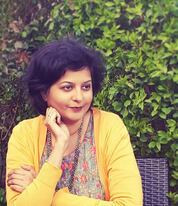 Susmita Bhattacharya is an Indian-born British writer. She won the Winchester Writers’ Festival Memoir Prize in 2016 and her novel, The Normal State of Mind (Parthian/Bee Books) was longlisted for the Words to Screen Prize at the Mumbai Association of Moving Images (MAMI) festival in India. She has been shortlisted for, and won, numerous prizes and awards and her work has been commissioned by magazines and for BBC Radio 4. Her most recent collection of short stories, Table Manners, was published by Dahlia Books (2018). It won the Saboteur Short Story Collection Prize in 2019, was finalist for the DLF Hall & Woodhouse Literary Prize and will be serialised for BBC Radio 4 Extra in January 2020. She lectures at Winchester University, facilitates the Mayflower Young Writers workshops in Southampton (An ACE funded ArtfulScribe project), and is a mentor supporting BAME writers for the Middle Way Mentoring project. Currently, she is working on her second novel. Second Prize, Strands International Flash Fiction Competition - 8 When J first heard the murmuring voices—coming from his wife’s closet, no less—he wondered if she’d left the radio on. He walked over. Why would she have a radio there when she hardly spent any time in that confined space filled with neatly hung dresses, handbags, shelves holding more clothes, documents, and a small safe containing valuables? Lately, with their daughter now in college, J and his wife seemed to have drifted apart. The ostensible reason for sleeping separately was his loud snoring, although it could have just as well been the growing silence between them. The silence took an ominous turn that evening, pushing their marriage into uncharted territory. But it was those bizarre voices, as if he’d gone bonkers, that started off the unsettling day. J was in the master bedroom, where his wife slept, to pick up a few of his personal items before taking a shower. She’d already left for work. Not having been near her closet recently, it occurred to him that the radio might have been put there to fill the silence. There was no TV in the bedroom. Stepping into her closet, he got a whiff of her perfume and felt a shiver of longing. It became quiet again, and though J looked around guiltily, he couldn’t see even a clock radio anywhere. Switching the light off, he headed to the guest bathroom. The murmuring sounds were gone, but not his disturbing thoughts. J was about to go down the stairs, after getting dressed, when he heard a man speaking in a low voice—and again, the sound seemed to be coming from his wife’s closet. Or was it in his head? It was creepy, giving him the chills. But J decided to get on with his routine. He wondered if his wife was having an affair, recalling her excitement when she told him about her new colleague, a Black man. Until now, she’d been the only person of color in her core team. Did her firm have policies on inter-office relationships? Of course, policies didn’t—or couldn’t—stop romantic desires. “Now I feel a little less alone” were her exact words, which she delivered with a smile. Slowly, J learned more about him. He was smart, she got along well with him, and he could be funny. Was he handsome? J wasn’t keen to find out, so he didn’t ask. She didn’t say anything about it, although J knew that he was younger than them (an advantage) and tall. Did he have a sonorous voice, perhaps not unlike what J heard upstairs? The colleague wasn’t married, crucially, but he did have a girlfriend. Not that those things mattered these days, J thought cynically. While the man had come from another city to take the job, his girlfriend wasn’t quitting her job to follow him. Interesting. Long-distance relationships were difficult to sustain, and before one did something about it, a girlfriend could become an ex-girlfriend. That was when J downloaded the app on his iPad, almost as an afterthought while waiting for his coffee to heat up. And then, instead of scanning the day’s news headlines, as he normally did every morning over coffee, he opened this new app to explore it. When he got back that evening, his wife was already home, to his surprise. Recently she’d been coming a little late because of, she said, management training—although J didn’t know who was training whom. He thought she was watching the news on TV, but she seemed more absorbed by her phone. Busy texting? He could tell that she’d gone to the salon, judging by her nicely coiffed dark hair. J greeted her, but she didn’t respond or raise her head. And then came the bombshell. The iPad, which he’d left on the kitchen counter, was lying next to her on the sofa. She must have seen the app! How could he have been so stupid? When she finally looked up, her gaze was steady, fathomless. He shivered, albeit inwardly, as if an icy blast of air had escaped through the vent behind him. “I see that you’ve been downloading apps,” she said. “Found anybody interesting?” Her tone was calm, even matter-of-fact, as if they were discussing a recipe he’d checked out. What was visible on the tablet’s screen, however, was an attractive woman’s profile. “Oh, I can . . . can explain that,” J said, feeling weak, as if his knees would buckle if he didn’t sit down soon. Hesitatingly, he told her that he’d downloaded the dating app impulsively. It was just curiosity. He didn’t mention that the possibility of being cut loose after two decades of marriage filled him with dread. Nor did he say that his tentative exploration of the dating scene for middle-aged men was just a test. But J said that the first month was free, and he planned to cancel the membership and delete the app after doing some research. “Research for what?” she said, switching off the TV. “My next story,” he said, chuckling nervously. Then he added, recklessly, “Well, you may be having an affair . . . with that new person in your core team. Are you?” Shock. Relief. Anger. Indifference. He couldn’t tell if her face registered any of those emotions, for she’d already risen from the sofa and turned away from him. “I don’t want to talk about this now,” she said, just before exiting the room. What did that mean? Was she too upset to talk, or did she want to reveal the truth later? J would have to wait to find out. Even somebody who never dreamed of cheating could fall in love unexpectedly—and, he thought ruefully, falling out of love could be just as abrupt. Perhaps his wife’s closet, if he was more patient, would spill the secrets of her heart. ~  Murali Kamma's debut book, Not Native, won the 2020 Bronze Independent Publisher Book Award (IPPY) for multicultural fiction. A collection of 20 short stories, of which 19 were previously published, it focuses on the lives of first-generation Indian immigrants in America. His fiction has appeared in Lakeview International Journal of Literature and Arts, Rosebud and Coweescoowee, among other publications. Currently the managing editor of Khabar magazine, he has interviewed many authors, including Salman Rushdie, Anita Desai, William Dalrymple, Chitra Divakaruni and Pico Iyer. He earned degrees from Loyola College, India, and SUNY at Buffalo in the United States. Website: https://www.muralikamma.com/ Third Prize, Strands International Flash Fiction Competition - 8 You go to the beach to get away from HIM. You take Arthur, your sloppy-tongued Labrador whose heart is as big as his head. Because you love Arthur. And he obeys you. You, Chris, also take a flask, having filled it with a concoction of guilt, forgetfulness, and a splash of ambivalence. Vodka stirred in to dull the taste. You consume your bitterness. The beach is pebbled. You smudge a bum print to sit. You throw a furry tennis ball Arthur has mauled. He retrieves it and returns. You drink. It singes your throat on the way down – the same throat you earlier yelled at HIM with – burning what’s hidden in your stomach. Your SON, SAM. SAM, not Sarah, you insist. Never Sarah. SAM. You live by your rules and SAM will as well. You blame Julie for leaving the way she did. Though you know you’d get a good telling off if she was here. She’s a beauty, isn’t she, Arthur? you say of the sea. You think it glistens and sparkles for your eye. It’s at this point, Arthur salivating at the thought of another throw, that the sea rises out of herself. She forms as a liquid human and drags her way towards you. This is real, you aren’t that drunk. When Arthur comes back, you cradle him into your lap. He is panting loud and you’re worried he knows something you don’t. You won’t admit you’re scared. Hey you, the sea says. Who me? you ask. Don’t play dumb. It’s the middle of May, you’re the only one here. You want to call for help, to Sarah, but you can’t. You remember what you said to HER this morning. I know you hear me, the sea says. She stands over you. So, why do you misgender me? You find it an odd question and have no reply. It is I who will tell you what to call me, okay? You nod. Even you understand calling the sea, she, is as illogical as calling Sarah, Sam. At that point, a cloud comes over and sends rain down on your head. Arthur, unfortunately, is collateral damage. The pebbles beneath you start to heat. You squirm. Lightning cracks close to you and Arthur jumps from your lap and runs off. You’ve keeled over and your hands cover your head. Nature is warning you you’ll lose HER. I whisper into your ear, though you can’t hear me anymore, that our child is not unnatural. That this, what you’re doing, is. You’re crying. You think of Sarah growing HER hair and wearing my earrings, my clothes. That big smile of HERS in the mirror when she thinks no one sees. You don’t have the words yet, but you hope to. Arthur bounds back into your embrace and you wipe your tears into his black coat. The sea slides away from you and into the vast expanse of the world, turns and points, and tells you to be better. ~ 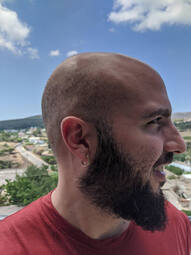 Joshua Kepreotis is a writer born in Australia of Greek heritage, and living in Greece. He has published essays in 3AM Magazine and HuffingtonPost Greece, prose and poetry in 100 Words of Solitude, Lucky Pierre and others. He writes through his experience, his privilege, and challenges dominant ways of thinking. Twitter: @joshkepreotis Honourable Mention, Strands International Flash Fiction Competition - 8 Now my lovelies, don’t be shy, come, come, gather round. See this glorious wool, plucked from the underbellies of rare breed sheep only found on the southern slopes of Welsh mountains. Nothing lasting is made from poor quality materials. What’s that Bella? No, the sheep are perfectly safe from dragons, even those hidden deep within their shepherd’s secret musings. Watch how my hands move as I start to work the wool - rolling, pinching, kneading, stabbing, forming into a ball or a sausage, or any other shape your body needs. Don’t be intimidated by the wool, it’s not the flesh of your firstborn, mewling as you push tiny limbs into scraps of pure white. Yes, Deirdre, it looks cruel, but you know that the best is formed when cruelty and the creative urge combine. Now, take your own handful of beautiful wool, inhale the redolence of feral childhood, coconut-scented gorse, tart mountain bilberries, roll it between your palms. Close your eyes and allow the wool to soak up any feelings you need to relinquish - the fleece is your friend. Feel free to use it to mop the tears I see coursing down the cheeks of some of you, my dears. Grief, rage, let it out, let the wool soak it all away. Your creation will be all the better for it. Now, take your needle. Stab away, stab, stab, stab. Don’t be shy, allow the needle to take you to another place. Stab, pinch, pull, stab. Mind your fingers. No Isobel, thimbles are a barrier, armour between you and the wool. Let yourselves feel your invention. Allow your blood to seep into the body you are moulding, every creation must contain some of us. Those of you who believe, think body of Christ. Good, you all have your bodies. Imperfect as they may be, they are yours. Gather around while I form a hind leg for a hare - I know some of you want to make hares. Such mystical creatures, gazing, the way they do. Running, the way they do. Who wouldn’t want to be a hare? See how I roll, pinch and stab. Did you know that all limbs begin in the womb as pentadactyl appendages? If your hare becomes an owl, don’t worry - wings are just decorated legs. And if your owl becomes a unicorn, or your unicorn becomes a baby, a lover, who are any of us to judge? Now, start shaping your limbs, legs, wings, arms… go with your flow, whatever your body desires. Yes Diana, tentacles are good, although perhaps not to worry about the fine detail, we’ll look at how to add delicacy and nuance in the coming weeks. Oh well done, my lovelies, just look what you’ve made, how much of yourself you’ve put into your craft. Cherish asymmetry in creation - what matter that your legs are of unequal length? Or a wing hangs broken and trailing? There is no wrong way to felt, my lovelies, or to feel. ~ 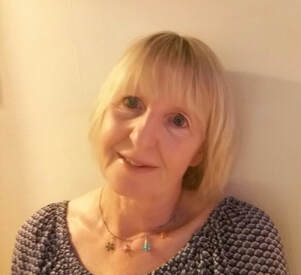 Anne Howkins started writing flash fiction in 2019, and relishes the challenge of writing very short stories. She won the 11 Sentences Rock and Retreat West Water themed competitions in 2019. She has also been second in Retreat West’s monthly micro fiction competition, and third in a quarterly Flash 500 competition. Her stories have appeared in print and online most recently in Reflex Fiction, Flash Fiction Magazine, National Flash Fiction Day, Lunate, Bath Flash Fiction Anthology 2020 and Gobstoppers, Shrimps & Sour Monkeys. She is a member of the awesome Fosseway Writers Group, who have been incredibly supportive. When not writing, Anne looks after the finances of a charity, and looks after, trains and competes her diva pony. Tweets @anne_howkins Short Fiction ~ Gillian Brown Honourable Mention, Strands International Flash Fiction Competition - 8 Paul rubs the sleep from his eyes and stretches an arm over to Laura’s side of the bed. Her musty scent tantalises his nostrils but his hand finds an empty space. A surge of disappointment smacks him in the chest. She’d come home tired and late from work last night, and gone straight to sleep. A strong coffee aroma filters in through the open door. With a sigh, he pulls on his jeans and tee-shirt and joins her in her kitchen. Laura doesn’t look up or speak. Caught in her spell, Paul sits down quietly across from her. Concentration ripples Laura’s brow and forms crinkles round her eyes. The glass table between them reflects her fragile beauty. As she presses her lips together, Paul frowns. Her lipstick looks brighter than usual. Bolder, somehow. Her left hand holds a delicately-shaped cup – her own creation, painted azure and gold. The sea and the sand, she says. Her eyes and hair, he thinks. He never touches her favourite cup for fear of breaking it. In her right hand, she grips a fine bamboo stick between her first finger and thumb. The glittery purple nail polish takes him by surprise. Laura always wears black. A froth of hot milk crowns the surface of the cafe latte. She gently draws the bamboo stick across the top. The pale foam parts, leaving a dark trace in its wake. Something clicks in Paul’s brain. She’s drawing a picture. He sharpens his focus. Laura’s art always contains a message. A map of Africa? No. It’s a head. The contour of a face emerges, followed by hazel eyes, curly hair, a nose, and a smiling mouth. Something about it seems familiar. Paul can’t think what. She hesitates a second, then grips the stick more tightly. She traces a beard, well-coiffed and trimmed to perfection. Corporate style. His chest tightens. He gazes uneasily at the crinkly hair. Lastly, she adds an earring. A drowning sensation sends his hand rushing to his neck. Laura lays the bamboo stick on the table where it forms a dirty puddle. She clasps the cup in both hands and takes a sip, her plum-coloured lips embracing the rim. Drinking slowly, she savours each mouthful, then lays down the cup. A bitter taste spreads over Paul’s tongue. Her eyes seek his. The truth is as clear as the portrait in her latte. He is Paul’s best friend, Tim. Her gaze softens. ‘I didn’t know how else to tell you,’ she says, the brutal truth delivered like a caress. The silence grows heavy between them. Paul’s fists tighten in his lap. He stares back at the cup. Tiny fractures zig-zag across the porcelain. The cracks widen. With a splitting sound, the cup shatters into a thousand pieces. Trembling, he pushes himself up from the table and heads for the door. A quick glance back. The cup is whole again. Slightly different. But just a cup, painted azure and gold. ~ 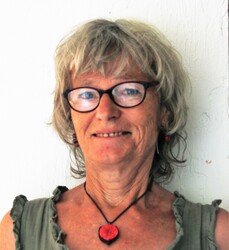 Gillian Brown started out as a travel writer but now concentrates on fiction. Her inspiration often comes from her travels or real life experiences. Motivation comes from short story competitions, for which she has a mild – but enjoyable – addiction. She has had stories published in magazines, in anthologies and online and won and been shortlisted in various competitions. Short Fiction ~ Soufyaan Timol Honourable Mention, Strands International Flash Fiction Competition - 8 You tread towards the shore, bare feet bristling with scabs and blisters, old and new, that send sharp shivers up your legs. The sands shift to allow you pass, scrunches within itself, fine layer into fine layer. Your clothes are torn and blood seeps through the myriad cuts along your back, your neck; drawing patterns over your skin, tracing lines of vicious agony. Your strength is failing, your muscles screaming for clemency, sinews stretched to spasming soreness. Pain lances up your abdomen into your torso, through your battered throat and past the fissured bone of your jaw, into your temples. It flares with your steps, each heavier than the last. You feel none of it. You walk towards the shore, a little girl in your arms. Her eyes are half-closed—half-open no more—the listless black irises lolling amid the reddish white. Beneath your fingers, her flesh is soft and scarce, her bones too gaunt, the shadow of a pulse still alive against your fingertips. Unmoving, her gaze is turned to the stars. Dirty dark hair flailing in the distraught winds, who offer you not a heartbeat of calm, as if the world itself is aware of the atrocity that walks its edge, is aware and cannot bear it. You failed. You stumble towards the shore, the night quiet as a storm’s eye, and yet cruel as the most savage of whirlwinds. Left is waterside. Right is waterside. The girl trembles—No. Your arms holding her body tremble. Your shoulders shudder, taken by sudden seizures as you wonder, yet again, why death lives in your embrace. You cannot face what you haven’t saved. You crumple on the shore, and the waves, roiling with the power of a fury you long consigned to oblivion, wash over your knees and through your blood-soaked clothes. Freezing against your skin, indifferent to the girl’s. The salt breaches your wounds and violates their chill, sets your flesh on fire, a fire immediately beggared by the tempest of your emotions. Tears roll down your cheeks to be instantly washed away. Agony. Woe. Sorrow ineffable. Violence confined and violence vain. You feel—nothing. The girl’s body slips from your grasp and, with a soft, almost muted thud, settles into the submerged sands. The waves pull her back inch by inch, whistling a lament that sounds like a scream as they take her hands and close her eyes, as they accept her sleep as their own, as their dark depth extends its slender clawed fingers and drapes her body into a cloak of starlit black. Still as a corpse, you watch. Empty as one, you decide. ~  Soufyaan Timol lives in Mauritius and has published a couple of short stories in the yearly anthologies Collection Maurice. He aspires to be a writer and is currently working on an epic fantasy novel titled Killing Gods. He can be reached through his email address : [email protected] Short Fiction ~ Davina Philomena Kawuma Honourable Mention, Strands International Flash Fiction Competition - 8 I could tell from the way the mannequin wore that dress that it would be too tight on me. (When like me you have trouble finding dresses that fit, your eyes develop a certain way; they train themselves to know when you should make someone go to the trouble of undressing a mannequin and when you shouldn’t.) But Anna, my sister, and Mummy, my mother, insisted. I tried it on just so I could say ‘Didn’t I tell you?!’ The dress went past my waist, hallelujah!, you should have seen the smile on Anna’s face, but wouldn’t go much further up. Anna tugged and pulled at the bodice while Mummy steadied me. I could tell from her rigid posture, and from the way her hand covered her mouth, that the shop attendant was afraid we were going to rip the bodice. But I suppose she was one of those people that truly believe in customers being kings, even when they are close to damaging your stock, because she said nothing. I stared at the ceiling and sucked my stomach in for as long as I could. I was glad, in a way, despite having to go so long without breathing, that the shopping hadn’t turned out as badly as I feared it would. I love Anna and Mummy with all my heart and soul, but I dread the prospect of shopping with them. Not only do they want me to try everything on, but they also turn every fitting into a board meeting of sorts; sometimes they’ll even ask other customers for their opinions. Do you know how embarrassing it is to watch people try to politely turn down Anna and Mummy? Worse, still, after ALL that trouble, sometimes they’ll have made the attendant undress ten mannequins, they smile and say ‘katukomewo.’ This they say even though they have no plans of returning to the shop, which just adds to my embarrassment. But what else could I do but stare at the ceiling and pray that nothing bad happened to the dress? Anna eventually managed to get the bodice just past my nipples. At this point, perhaps to ensure that the dress went all the way up, Mummy’s hands clamped down hard on my breasts. I screamed and pushed at her. I was as startled as she and Anna were by my reaction. I’d had ‘accidents,’ of a similar kind before but the pain had never been that bad. I pulled the dress down and said I didn’t like it and could we please go somewhere else? Mummy said nothing, she immediately made for the exit, which meant Anna had to do the smiling and thanking and fake promising all by herself. ‘So, where next?’ I said, when we were all out of the shop. Anna asked what had happened back there in the shop and I said Mummy hurt me. I tried to sound as casual as I could. ‘Where?’ Anna asked. I pointed to where the lump was. I said it sometimes hurt and it sometimes didn’t. That it was really not that big of a deal, as I didn’t even really think about it. Anna and Mummy took turns feeling my left breast through my blouse, right there on the sidewalk. Some people pretended not to notice, others stood and pointed, but Anna and Mummy didn’t care. They prodded, gently, at the lump. Then they did the same with my right breast. ‘How long have you had it?’ Mummy asked. ‘I don’t know,’ I said, ‘A long time.’ ‘When did it start hurting?’ I pretended to think about this, although I knew exactly when it first started hurting and what I’d been doing that day. But of course, I wasn’t about to tell Mummy anything about that day, so I just said, ‘I can’t remember.’ ~ 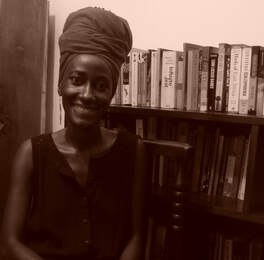 Davina is a Ugandan twice over (fed and bred). She loves to write as much as she loves to read. She has a wide range of interests, including the socio-cultural evolution of religion, mythology, and the modernization of language. She's passionate about improving the research culture in post-secondary school teaching and learning contexts. In her ideal world, she exists as a cross between a Rwenzori Turaco and a Venus Flytrap. She's currently pretending to write (among other things) her first novel, whose working title is "The Other Side of Day." Poetry ~ Marianne Mersereau Miracle in the Chicken Coop Chapel “With God, all things are possible.” ~Jesus (Matthew 19:26) I’m sure many miracles took place in the chickens’ home- like the narrow escape from a fox or snake, but the one that stands out is the tongue that was reattached. My aunt tells the story this way: How her sister fell and sliced her tongue almost completely off. My grandmother picked her up and ran into the chicken coop, praying in the name of the Father, the Son, and the Holy Ghost as the hens squawked their praise in that sacred space. The torn tongue was made whole again. When you live far from the doctors and you don’t have a car nor money to pay them, you learn to believe in impossibilities. ~ What You Can Do when you have to will surprise you. My mother assures me of this- her story as proof. Raised on less than a dime in a house with no indoor plumbing, her father died when she was nineteen, his neck broken in a car wreck. She never talked about him much, just did what she had to do: joined the Women’s Army Corps, served as a post-WWII nurse. Of the wounded soldiers she said, They just kept coming. I surprised myself a few times doing what I had to do. I trace the letter M on my palm: Letting her go was hardest. ~ War Ghosts in the Attic We grew up hearing the story of the wooden legs and how they used to be in the attic of our old farmhouse and got up to walk around at night. They belonged to the former owner, a Veteran of WWI who lost his real legs on a battlefield in France. My father tried to convince my mother that the attic sounds were mice, but they haunted her, so he burned them in a bonfire and the attic became quiet but the ghosts from my father’s past kept walking through his dreams, crying out in his sleep, reminding him of how he’d lost pieces of his right leg on a battlefield in WWII. ~ He Was Most Afraid of Lightning Not of tumbling on the tractor getting bitten by a copperhead running out of money having no health or crop insurance losing the tobacco plants to cut worms, black shank disease or drought. No, my father feared the dark clouds electric air, flattened fields cows sheltering underneath trees the sudden jagged flash of red orange yellow missile searching the ground for the tallest target. We sat once on the porch watching a storm, saw a lone hay bale on a distant field become a torch and my brother recalled the terror of being struck while riding his bike, stunned that he was alive to tell us about it. ~ Pearl Harbor Just another sunny day - like December 7, 1941 was just another day. Aloha, Daddy, I speak into the cell phone. He’s eighty-four and far away. I try to imagine him here after the bombing, his ship leaving for Okinawa. He tells me that was a long time ago. You want a souvenir, perhaps a cap? His souvenir is the scar on his leg, seared into memory. Forty days in the hospital like Jesus in the desert. As kids, we knew which side of his lap could not hold us. I buy him a cap that he wears with pride, try to feel his footprints on Waikiki- Give thanks his name is not on the memorial. ~  Marianne Mersereau grew up in the Southern Highlands of Appalachia and currently resides in the Pacific Northwest. She is the author of the chapbook, Timbrel (Finishing Line Press, 2013). Her writing has appeared in The Hollins Critic, Bella Grace, Entropy, Still Point Arts Quarterly, The Dead Mule School of Southern Literature, Deep South Magazine, Seattle’s Poetry on Buses, and elsewhere, and is anthologized in Public Poetry Houston’s Anthology, Enough. She was awarded a Second Place Prize in Artists Embassy International’s Dancing Poetry Contest in 2018. OUR LOST HOME Told we can take with us all we have, which is nothing, we stumble over crumbled brick worn orange with age from its original red in the abandoned schoolyard we now cross. Once our scraped knees embedded with stinging gravel bits bled, but now home’s no longer a place we can run. Overgrown with our absence, any attempt at being recognized there is futile. The color of our rooms is no longer our color. Faces sitting at the kitchen table are no longer our faces. Neighbors no longer know our names, are no longer our neighbors. Although we’re not there, will no longer be there, ought to infer we’re somewhere else. Somewhere not much different than where we once lived. Perhaps here on Earth when it existed as a planet and not the result of humans exceeding their grasp with nothing gifted in return to the universe. Nothing, that is, but ignorance, miscalculated suppositions, and collective waste. Nothing but disabled satellites orbiting a scrapyard in space without the usual weeds, chain-link fencing, mud-deep potholes, or the flaking rust our still breathless air relishes. Nothing but the brilliance long dead stars freeze in our sight for as far as we can see without once looking back. ~ NO ADMISSION CHARGE From where has the world come that we must all leave so soon? Was it already there before we arrived or something we created along the way? If so, what’s stopped us from making it perpetual? Is it that dreams come true only when we sleep? Is it that time’s accumulation weighs us down, wears us out only because we allow it? Is there no chance of us ever becoming perennial? Do we first have to be akin to purple trillium, fragrant tarragon or apricot bearing trees? Must we always start naked, crack open then cry aloud like a seed the Earth softens before it can sprout? And what of the growth over which we learn to stand and admire if not our own? What besides Earth nourishes it, what drips a simple water between the parted lips our mouths yearn to open from each fragile root end? What of the Earth we leave behind, left to its own revolutions? Will anyone be there? Will everyone be somewhere else? And that somewhere else, where will it be? Does searching for it mean it’s lost or by admitting it exists suggest it can be found? Either way, before every desolate expressway and abandoned boulevard we come across, it’s been hard not to look both ways. ~ MISUNDERSTANDINGS Forced to learn an acronymic language, I choose silence and nod when questioned. The little I comprehend has been supplemented by a desire to preserve myself. I’ve grown sick of seeing my reflection in bent fenders at auto repair shops, in shiny magnetic security strips lining glass doors into bank vestibules, in a grocery scale’s thumb-smudged digital read-out, in a pharmacy counter’s closed-circuit tv, on the convex back of spoons dropped by babies off height-chair trays, in between a bloody fat speckled knife and its blade’s blinding flash, in wrap-around department store dressing room mirrors, at the bottom of not quite boiling pots of water, in car rear and side view mirrors, and in sneeze-guards protecting all casino buffets and salad bars lining the boulevards of false aspirations. Anything I can do to escape myself and avoid what all these sightings have done to me, becomes a maniacal priority. If I’m going to see myself, then I’d rather it be at the edge of this lake overlooking ice crystallizations caught between black shore rock. I’d rather be where water droplets collect in a cup open tulip petals form for a few short mornings. I’d rather be within a rainbow’s mist that shimmers my body in its transparent colors. Be this way or else fall beneath the spell of a language that’s no longer a language, a language whose utterances are mere symbols of the symbols words were never meant to be. ~ ALONENESS Snow, making ghosts of the wind, swirls past us on this desolate county road. In need of a fire, we hurdle guard rails in search of a place protected from road and wind. Night inches toward us. The sound of water’s rapid flow draws us closer to its source. Just over one of many low drumlins, we glimpse a fast moving creek splashing rock and twisted tree limbs fallen across its furious path. We locate a dry space under thick pines close by. The fire is small at first. Bits of twigs, dry grass tips. Either damp or caked with frozen mud, the wood’s kept close by the fire, fed slowly so as not to make smoke. Careful not to give ourselves away, to stay hidden, invisible to all but each other. If caught, we’d be jailed until a trial determined a verdict that would lock us away from ever hiding again. Careful never to divulge our whereabouts or that we even exist, we’re content never having to show up where we’re unexpected. Invisibility’s our presence. We’re at peace with the dust our shoes collect as a reminder of who we are with each and every step. ~  Paul B. Roth has been published widely in the United States and his work has been translated and appeared in journals from Japan, Peru, Israel, Bolivia, Italy, Ecuador, India, China, Mexico, Italy, Romania, Estonia and the UK. He is the author of seven collections of poetry of which his most current are Cadenzas by Needlelight (Cypress Books, 2009), Words the Interrupted Speak (March Street Press, 2011), Long Way Back to the End (Rain Mountain Press, 2014), and Owasco: Passage of Lake Poems (Finishing Line Press, 2018). In 2018, he was nominated for a Pushcart Prize. He lives in Fayetteville, NY where he’s served as editor and publisher of The Bitter Oleander Press since 1974. Poetry ~ Sumera Saleem Corona-War-ning Inside, I feel the pulse, keeping hours in my skin, And care a pillowed heart. I remember how distance was never Stretched on the map of our troubles. Connection like a munia kept soaring up In a space called peace, serving Messages of life and death, soul and breath. Outside the window, my senses hang on the future, Fragile, moving like fluttering shirts, Hanging on a clothes line, Oscillating in the midst of the wind. Fears sail within unknown zones of silence. Flying in every direction, And settling nowhere is the dust of unreality. A while ago, pigeons were freely wheeling on A cool air, but when a sense of danger pulsed Through their wind-ruffled bodies, They hurriedly alighted on the wall, A rapid rustle back home. Even inside the cage, they kept on cooing as if they were still busy defending their territories Against rising dark clouds just like the way We have been doing during quarantine, Rushing inside our cages. A hurried flight back home to defend our territories, When every whiff of the wind was a warning, No other defense against rising wind we could think. It's just now that we’ve realized or perhaps We haven’t, that despite having Gadget-driven success how uncertain The ends we all share, all, Including the beings we used to control. ~ Against Nudity We all long for truth, be it alien or native Though our bodies discredit outsiders In diseased cages of ribs for the desire to heal, Being tired of how everyone should feel. Three devils of our ailing doom: The zodiac, the unreal fears and the unneeded answers When questions frown at good hearts That we all wear on our body sleeves, Slipping from which is the silk of senses All naked, slaves of our own treachery. Lies are the leaves we cover with our nakedness, Flipping answers, flopping questions, Truth is stubbornly nude, a misery to the mirror of being. Some keep up the tradition of wearing The cloaks of dignity, trimmed with many rags of empty pockets; Kept unstared by the times, damned by frenzy-struck prayers. ~  Sumera Saleem is a lecturer in the Department of English Language and Literature, the University of Sargodha, Sargodha, Gold medalist in English literature from the University of the Punjab, and former sub-editor in the department of English, University of the Punjab, Lahore, Pakistan. She has published poems in National and International literary magazines. |
StrandsFiction~Poetry~Translations~Reviews~Interviews~Visual Arts Archives
April 2024
Categories |
 RSS Feed
RSS Feed